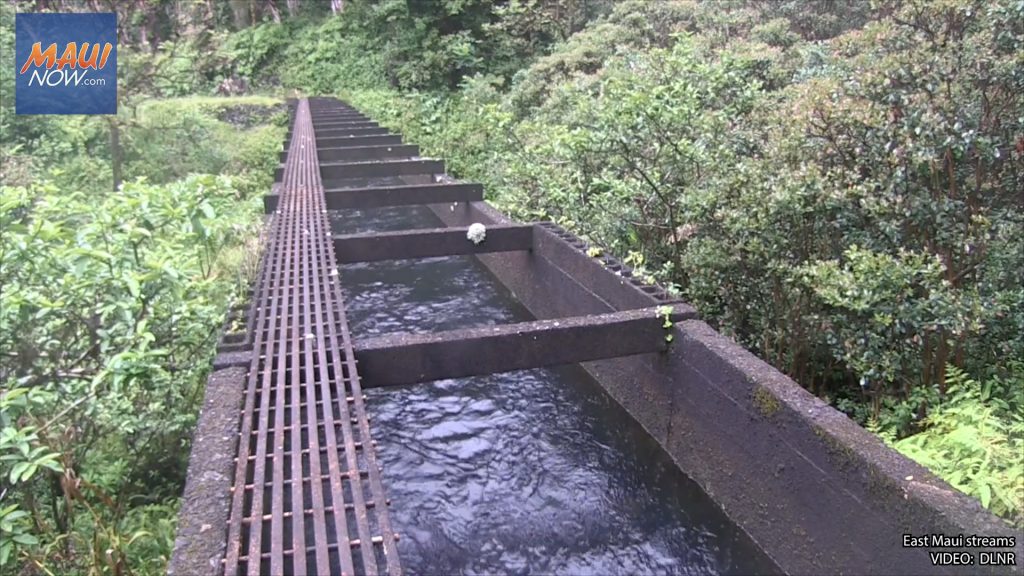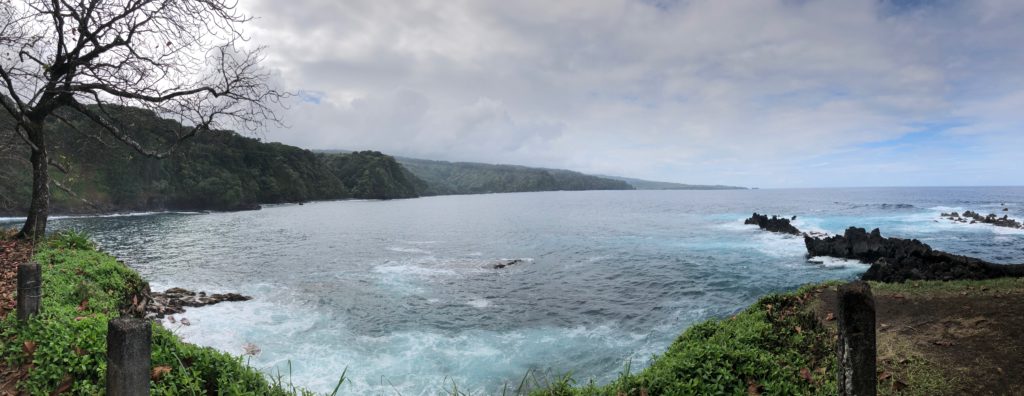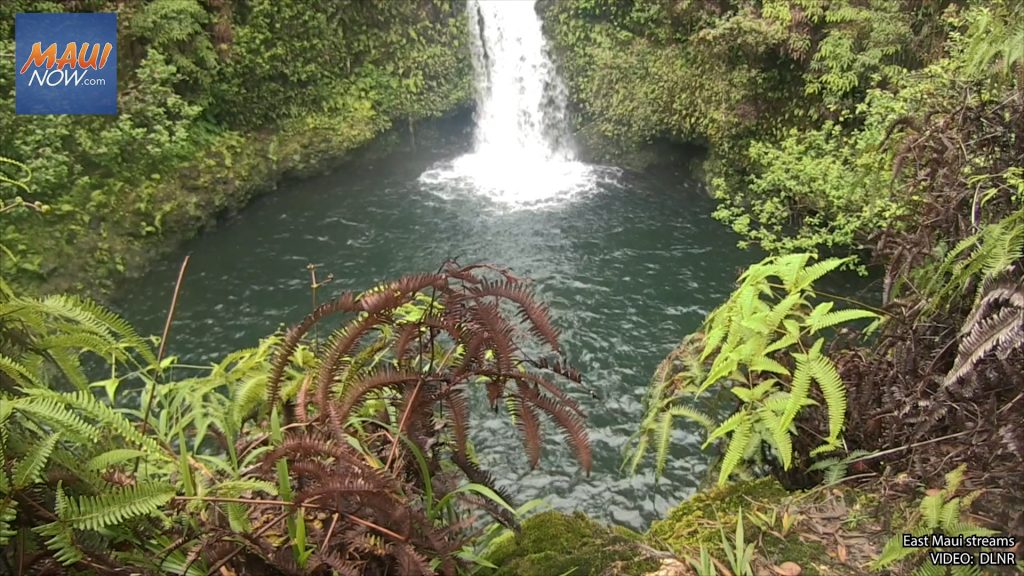Former mayor, kalo farmers selected for new board to steward water in East Maui

The Maui County Council named six members to the East Maui Regional Community Board on Friday, including:
- Moses Bergau Jr. (Nāhiku)
- Janet Redo (Honomanū)
- Norman Bush Martin Jr. (Keʻanae)
- Lurlyn Scott (Huelo)
- Former Mayor Alan Arakawa (farming)
- Francis Quitazol (water resource management)
A seventh council appointment for the member representing the Hawaiian Homes Commission was left blank as the council awaits a formal response from the Department of Hawaiian Home Lands following their meeting on Monday.
An additional four members will be appointed by Mayor Richard Bissen, to round out the 11-member body. On May 2, Mayor Bissen transmitted his intended selections in a letter to the committee, which included the following names:
- Kyle Nakanelua (Ke‘anae)
- Moses Kahiamoe, Jr. (Nāhiku)
- Hugh Starr (Honomanū)
- Lester Wong (Huelo)
The establishment of a Maui Community Water Authority and Community Board were approved by voters at the Nov. 8, 2022 General Election. The Council’s Water Authority Social Services and Parks Committee then met on May 8 and 30, and June 5, 13 and 19 to consider the applications for the various seats to the newly formed East Maui Regional Community Board.
Returning stewardship to East Maui residents

“For over 100 years… fresh water has been diverted from East Maui streams. For over 100 years, the voices of local residents have been silenced in the name of profits and progress,” said Committee Chair and East Maui Council member Shane Sinenci, who introduced the resolution.
“The sugar industry of Central Maui ballooned and blossomed from a lot of this water. Banks, buildings and commerce—the big companies profited immensely. This industry devastated the natural environment. People were displaced and left their homelands to work in the sugar cane fields. Ancient rain forests were destroyed, including the Upcountry forests that attract the marine layer and rain giving clouds—and we now suffer from regular droughts and water restrictions,” he said during discussion on Friday.

“Taro farmers of Keʻanae have spent a quarter century fighting for precious wai—precious wai to water their kalo production, and against egregious practice of no Environmental Impact [Statements]. There has been an aging plantation system full of leaks and a watershed full of invasive species,” he said.
Sinenci said the passage of this charter amendment returns the stewardship of the East Maui watersheds toward local residents of East Maui, “residents who have often sacrificed their lives maintaining this system, and who had to idly watch as their life suffered from a lack of water,” he said.
Farming, ranching, aquaculture or loko iʻa representative

The Council’s selection of former Mayor Alan Arakawa to the East Maui Regional Community Board for a five year term, was approved by a slim 5-4 vote. Yes votes included support from Kama, Sugimura, Cook, Uʻu-Hodgins and Lee. No votes came from Paltin, Johnson, Rawlins-Fernandez and Sinenci.
The seat called for an individual with active engagement in ranching, farming aquaculture or loko iʻa in the area where water service is provided.
Besides his former role as mayor, Arakawa has worked since his childhood on his family’s 36-acre farm in Ōmaʻopio. The farm currently grows mango, avocado, lychee, papaya and other assorted plants. Previously, the farm raised other vegetables in addition to hogs and cattle.
Council Presiding Officer Pro Tempore, Tasha Kama expressed support for Arakawa saying his whole life’s work was dedicated to water and wastewater. “He knows the ins and outs of EMI… He’s always been in the trenches. He may not have agreed in wanting to do this, but once it’s here, we need to figure out how to make it work. As a farmer that’s what he desires to do,” she said.
Council member Tom Cook said that he was supporting Arakawa despite opposition from others. He said Arakawa signed a Consent Decree 20 years ago relating to East Maui Water, and tried to buy property and infrastructure from Wailuku Water Company in 2016. “He can do the job,” said Cook.
Councilmember Tamara Paltin said her choice would have been Jennie Kaahui, a farmer and owner of Kai Ala LLC in Haʻikū. Paltin and Rawlins-Fernandez said it would have provided more gender equity on the board.
“There’s no way I’m going to be able to support Mr. Arakawa,” said Paltin, who noted that three water related bills advanced in Council on Friday. “They never passed in the 12 years that he was Mayor, they never passed in the six years he was on the Council,” she said.
Paltin also criticized Arakawa’s selection of Stewart Stant in 2015 as director of the county’s Department of Environmental Management. Stant was later convicted of honest services wire fraud involving the acceptance of multiple bribes totaling up to $2 million.
“If that’s any example as to his record in water or wastewater, I donʻt think he has any place on this board,” said Paltin. “Itʻs a ‘hard no’ for me.”
Council members Rawlins-Fernandez and Gabe Johnson agreed with a ‘hard no’ for Arakawa.
Johnson said he would have preferred Brendan Balthazar, who retired from the Maui Fire Department and Diamond B Ranch in Halehaku. On Monday, Council member Sinenci was also leaning toward the recommendation of Balthazar, saying, “he has extensive ranching experience, advocacy for agriculture, and longtime experience working on community boards.”
Water Resource Management experience

In another close vote, Francis Quitazol was selected for a four year term to the spot designated for an individual with water resource management experience, who resides full time in the area where water service is provided.
Council member Sinenci said Quitazol “has the professional experience needed for the board to properly fulfill its role in the development of watershed management plan, policies and implementation.”
Quitazol is a Project Manager with SWCA Environmental Consultants, and previously worked s a Natural Resource Manager with The Nature Conservancy of Hawaiʻi, and field crew leader with the Research Corporation for the University of Hawai‘i at Haleakalā National Park. He is a graduate of St. Anthony High School in Wailuku, and earned a B.A. in Agriculture from the University of Hawaiʻi at Hilo.
His work has involved the writing and implementation of long-range management plans, specifically for the mauka East Maui watershed.
Nāhiku

For the council’s selection of the Nāhiku license area representative, all were in agreement on the selection of Moses Bergau Jr. to a 5 year term.
“Mr. Bergau is a lifelong resident of the area who has physically worked in the watershed,” said Council member Sinenci. “He has family ties to the area, providing him with generational knowledge in addition to his own observations. His experience will be invaluable in future watershed management of the Nāhiku area.”
In his application, Bergau said he learned about water flows at Makapipi Stream from his tūtū kāne who was involved in building and managing Nāhiku’s water system.
Honomanū

For the Honomanū seat Janet Redo was selected for a four year term.
Members approved of the selection in a 6-3 vote with the dissenting votes (Paltin, Rawlins-Fernandez, Cook) favoring Moses Jerome Kikiwi Jr, who is president of Nā Moku ʻAupuni ʻo Koʻolau Hui.
Redo has lived in Keʻanae for more than 70 years, and has been a taro farmer and watercress distributor for many of those years. In her application, Redo noted that her father, James K. Hueu, had been the manager for East Maui Irrigation for 40 years, and had educated her at a young age regarding water irrigation in the area.
Keʻanae

Norman “Bush” Martin Jr. was selected to a three year term as the Council’s choice for the Keʻanae license area.
Martin is the Vice President of Nā Moku ʻAupuni ʻo Koʻolau Hui, which was organized in June 1996 to educate, perpetuate, serve and protect historical, spiritual, traditional and environmental well being of the Keʻanae/Wailuanui area. The group conducts monthly community work days involving stream management and cleaning.
In his application, Martin said, “As a kalo farmer, you are not only responsible for planting, maintaining and harvesting—it includes knowledge of all mountains and streams, maintenance of water systems and repairs, cleaning ditches and regulating water flow,” which he notes he has been doing for three decades. In addition to his farming work, Martin is also a caretaker for the Maui Department of Parks and Recreation.
“He has existing good relationships with A&B, EMI and Mahi Pono, which is necessary as the board begins its new role in water resource management,” said Sinenci during Mondayʻs Water Authority Social Services and Parks Committee meeting.
Martin noted that he believes in incorporating both traditional and western knowledge to improve the sustainability of the Keʻanae-Wailuanui Ahupuaʻa.
Martin was selected in a 7-2 vote.

There was also a strong push for Harry Hueu Jr. who is a fellow taro farmer. Council Vice-Chair Yuki Lei Sugimura said she hopes the mayor picks Hueu up as one of his selections.
Council member Kama said many who came to testify spoke favorably of Hueu.
“Everytime this issue came up, people came to testify on his behalf, and then he comes up and testifies on other people’s behalf. I mean, how humble do you think this man is going to be when he has to work with 10 other people who have different views and perspectives and ideas about stuff,” said Kama.
“I could see him just sitting in the back listening and waiting to hear what everybody has to say, and then he’s going to come up with something so profound that he’s going to change the mindset of the people on that board,” she said.
Huelo

In a close 5-4 vote, the Council selected Lurlyn Scott for the Huelo license area seat, for a term of three years.
In her application, Scott said her experience as a kalo farmer in Honopou, experience in management of the watershed, and generational knowledge make her a top candidate.
Her mother, Marjorie Wallette and aunt Beatrice Kekahuna were plaintiffs in the East Maui contested water case. “I spent many hours with them in court, on site inspections of East Maui Irrigation canals and water systems,” Scott wrote in her application.
Scott said her membership in the Taro Security and Purity Task Force enabled her to view areas of kalo cultivation throughout the islands and hear of their own water issues.
The breakdown included yes votes in favor of Scott from: Kama, Paltin, Johnson, Rawlins-Fernandez and Sinenci. No votes were from Sugimura, Cook, Uʻu-Hodgins and Lee.
Work ahead: “Heart and Soul of East Maui Water”

Council member Gabe Johnson said all are in agreement that water is a public trust, and he believes in the pubic trust doctrine.
“Iʻm glad the voters see eye to eye on that and recognize that something needs to be done… At some point, our people will have a say in their water, and thatʻs how it should be,” he said.
Council Presiding Officer Pro Tempore, Tasha Kama said the board is going to be able to do justice for the community.
“These people that we just announced… plus the four that the mayor has already appointed—these 11 people are going to be the heart and soul of East Maui water,” said Kama. “When you think about what we have to do, it’s about changing our mindset … and you can only start changing your mind when you understand what a kalo farmer really is.”
“It’s not just planting and watering and gardening. It’s that whole life force that takes place when you are in that loʻi. And that’s what you do not get if you don’t work in the loʻi…. We miss so much of who we really are, and kalo farmers know who they are. They don’t have an identity crisis. They know what and who they are. That’s the kind of mindset that I think needs to be on boards and commissions,” she said.
The application deadline was extended from an original April 28 date to June 6 to ensure there was a broad selection of qualified candidates. Ultimately 19 candidates applied for the various positions on the East Maui Regional Community Board.
Council Vice-chair Sugimura thanked the many people who did apply. “Please know that what we heard from you is your passion for wanting to be part, wanting to make a difference—and I hope you continue. It doesn’t only have to come from this East Maui Community Regional Board,” she said.
Council member Sinenci said the levity of moving this board forward is long awaited.
Discussion turns contentious as members ‘clear the air’
Sinenci initially recommended Lucienne De Naie to serve in the capacity for Huelo, “based on her experience working to develop the water authority concept and legislation, as well as her extensive knowledge and experience working in the Huelo watershed area.” But on Friday, the recommendation had changed to Scott instead.
During Monday’s committee meeting, Council member Nohelani Uʻu-Hodgins voiced opposition to De Naie saying, “She has some outstanding fines with our planning department, and it would make it difficult to support her on this.”
During the same meeting, Council member Tom Cook said he had problems with De Naie having been with the Sierra Club which sued the county over Maui water. “I think that the ongoing challenge is to develop water source in the Haʻikū area has been a detriment to the community. Although she has contributed in many ways, that prevents me from being supportive,” said Cook.
Cook and Council chair Alice Lee expressed support for Darren Strand instead for Huelo, saying broader agriculture experience would be beneficial. Strand was the former VP of Business Development for Mahi Pono and current director of the Hawaiʻi Farm Project.
Council member Gabe Johnson said he couldn’t support Strand because he was against the commission he was applying for. “It doesn’t make sense. Nevermind [his] connections to Mahi Pono. The water is the money that’s on the line for these companies,” he said.
Council member Tamara Paltin said it was refreshing to hear there were two women candidates (Scott and De Naie) that were supporting each other and working together.
Council member Keani Rawlins-Fernandez said she would have preferred De Naie, but called the selection of Scott a “two-for-one,” since both were supportive of one another. She said “disparaging comments” made about De Naie on Monday were unrelated to her knowledge and abilities to serve as a member of the board, which Rawlins-Fernandez said De Naie is “unarguably qualified to be placed.”
“As representatives of our community, we are held to a higher standard of professionalism,” Rawlins-Fernandez said. “When unpaid community advocates become too effective in holding the government accountable to the community in following its own laws, elected officials employ tactics to smear the reputation of good people… I donʻt think that individuals who hold the county accountable when the county may not be following its own rules and laws should be punished for doing the right thing for our community and protecting water,” said Rawlins-Fernandez.
In her closing remarks, Council member Uʻu-Hodgins said, “I’m so frustrated at the hypocrisy that some people are so comfortable sharing. Let me remind you–before I was a council member, I was up for a board. Some of you had no problem talking about me, talking about my family and where I come from; and now you want to sit here a pretend that we have a higher moral compass?When? Where? Why? Why now?”
She continued: “So many people didn’t apply for boards commissions because they didn’t want to face this board, and hear the (expletive) about them, including me. And now, when we have a right to voice our opinion because we have decided to stand up, now I cannot? No way. Absolutely not. I have a right to say how I feel. I have a right to vote the way I want to vote. And if we are going to start stopping disparaging comments, great. When do we begin?”
“If we stop saying mean things about other people, half these people would be quiet for the majority of the meeting,” said Uʻu-Hodgins, saying members should start by “looking within.”
“I’m also happy that member Uʻu Hodgins finally took an opportunity to get that off of her chest… I recall council members actually being supportive of member Uʻu Hodgins,” said Rawlins-Fernandez in her closing remarks, “and then we found out that there was a shared income and it was a financial conflict, and we remorsed that it was not the Police Commission or a different commission so that we could have voted in support, but it was the Fire Commission and I won’t go into further detail, but that was the reason.”
Rawlins-Fernandez continued: “I didn’t think it was disparaging and I’m sorry that member Uʻu-Hodgins felt it was disparaging, but I’m happy that that’s cleared the air, hopefully.”
When Rawlins-Fernandez concluded her thoughts, Council chair Alice Lee remarked: “Well now I’ve seen everything.” Lee said her recollection of that time was a little different, “but of course I voted for her, and I would vote for her again.” She thanked Rawlins-Fernandez for explaining her point of view. “Let’s clear the air and not hold things inside and that way we can even perhaps work better together.”
Dispute over procedure ironed out
During the meeting, Rawlins-Fernandez also questioned the procedure for determining candidates for the East Maui Regional Community Board. In addition to the slate of names introduced as an amendment by Council member Sinenci, there was a separate slate presented as an amendment by Vice chair Yuki Lei Sugimura.
“My understanding, since I’ve been on the council is that you can’t substitute a substitution,” she said.
Corp. Counsel advised: “The gist is that like with any amendments, you can basically go two levels. So you can have your main motion, and amendment to the main motion. Then you can have secondary amendment. Which is amending the first proposed amendment. ‘It is thus possible to introduce a proposed substitute for a substitute which cannot be amended since it’s a secondary amendment.'”
Counsel advised that amendments could not be made to Sugimura’s proposed substitution, and the item was withdrawn so that the council could go block by block in reviewing each candidate on Sinenci’s list based on their individual qualifications.
Gabe Johnson’s said an up or down vote to an entire list is not what he’s used to seeing, and preferred to go through each candidate to determine if there was agreement. He also said that if the board was specific to the island of Lānaʻi, he would have “been a little sassy” and submitted an entire slate as well.
Rawlins said the second amendment by Sugimura created a situation where the council’s hands “were procedurally tied.” She called the development “new and very sneaky,” and agreed that the names should be taken up one at a time, “instead of shove this list down our throat, because you guys have the majority vote.”
During earlier comments, Rawlins-Fernandes said, “We all know that power concedes nothing without a demand, and this charter amendment was that demand–a demand to do better… not to do the same by putting the same people into these positions that caused the damage when they had the power that compelled the public to establish this water authority in the first place.”
Lee said the amended list was an attempt at compromise. “We’re not shoving anything down anyone’s throat. A 3-3 compromise is hardly shoving down anything. So let’s not use inflammatory words. If you disagree with something just say you disagree with something and why, and then we can consider whether we want to proceed with a vote or not.”
Lee said, “Today believe it or not, was an example of a very strong effort to compromise. It could have been what they call ‘railroaded,’ but it wasn’t. And we tried very hard to meet your concerns and respect your concerns, and I think we accomplished that today.”









